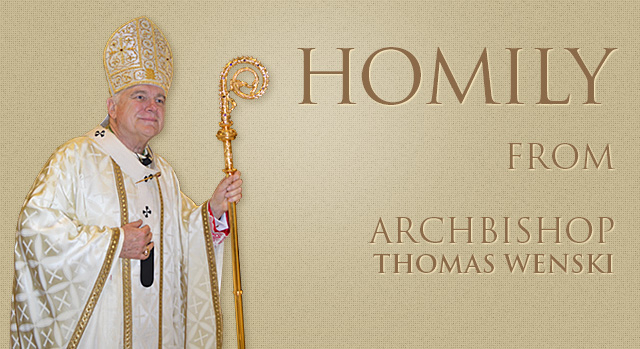By Archbishop Thomas Wenski - The Archdiocese of Miami
Archbishop Thomas Wenski preached this homily during a Mass with the Caribbean bishops attending the CELAM workshop at SEPI (the Southeast Pastoral Institute), June 21, 2017.
“He who sows sparingly will reap sparingly.” “He would sow bountifully will reap bountifully.” St. Paul is giving the contentious Corinthians a lesson in how to give, and how not to give. Implicit in the sowing sparingly is the desire to hold back, not to commit oneself totally, to hedge one’s bets so to speak. This would be, St. Paul tells us, how not to give. Rather he says give bountifully, cheerfully. Giving bountifully, cheerfully means giving from the heart – from a heart that wants to share, to give as much as possible.
The icon of a heart that wants to share and give as much as possible is the Sacred Heart of Jesus. The Sacred Heart of Jesus reminds us of the humanity of Jesus – but also of the concreteness of his love. Love is not an abstraction, it is not a philosophical axiom; love is always an action, a deed. It is a “giving away” of one self – even as Jesus gave himself away – unsparingly -on the cross for our salvation.
Today isn’t the feast of the Sacred Heart – that’s in a few days but we celebrate today St. Aloysius Gonzaga, a Jesuit saint – and like all his Jesuit confreres he had a special devotion to the Sacred Heart. The message of the Sacred Heart communicated to the world through St. Margaret Mary came at a critical important time in the Church’s history. At that time, a heresy called Jansenism was infecting the Church. This false teaching held many dangerous beliefs, among them a radical pessimism about human nature, a belief that most people would be damned and only a few saved.
Jansenism promoted a rigorous observance of rules that robbed the souls of the faithful of joy. If you contemplate a crucifix you see Jesus’ stretched out on the cross – his arms open wide as if to embrace all of humanity. But the Jansenists believed that Jesus died only to save a few – and not the many. And, thus, the effect of their heresy was to stifle hope in the hearts of believers.
Thanks to St. Margaret Mary and the spread of the devotion to the Sacred Heart of Jesus, Jansenist heresy of despair and hopelessness was refuted and rooted out of the Church.
At the basis of the gospel message is the call to metanoia – or change of heart so that our basic desire is not to keep as much as possible for ourselves but to give and share as much as possible. It is as though there was a magnet in the soul that was turned so that it pulled possessions into itself, and now something has happened – that something we call grace – that has turned it around to the other pole so that it pushes things out towards others.
And, I think, both the coming feast day of the Sacred Heart and today’s first reading remind us that God wants to be known and trusted and loved as the Giver not the Taker in this whole affair of giving.
Jesus’s words on righteous deeds, praying and fasting in the gospel today also make pretty much the same point. How we see God will affect the way we pray, fast or do good deeds. If God is for us the Taker then all our giving is draining, burdensome, oppressive, legalistic, and sparing. But, if he is, as Jesus presents him to us, the Giver then we can discover the joy of the gospel – as St. Aloysius did, in the giving away of ourselves.
Again, as St. Paul says, in Second Corinthians: “God is able to make every grace abundant for you, so that in all things, always having all you need, you may have an abundance for every good work.”

